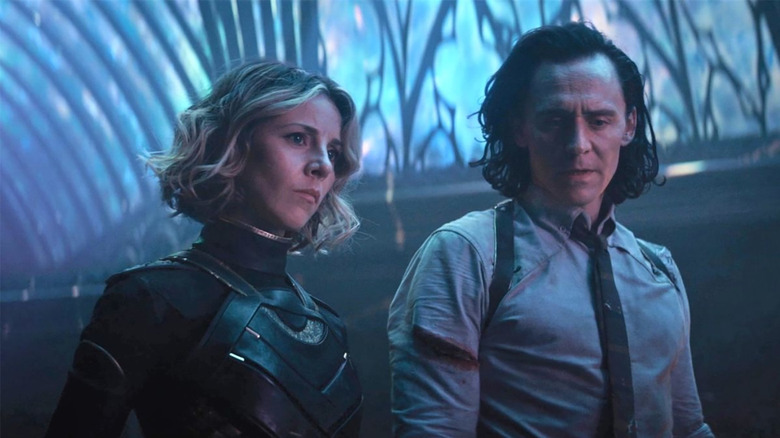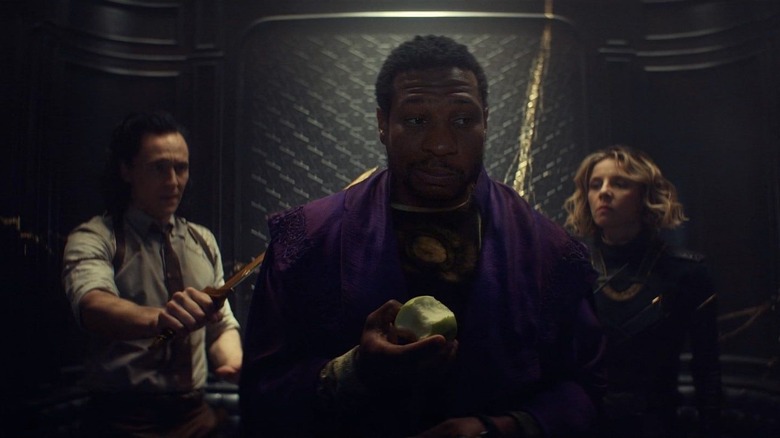Kevin Feige Confirms Loki And Sylvie Broke The Multiverse, Thanks A Lot Guys
Look, he's not called the God of Mischief for no reason, ya know? Even if Tom Hiddleston's over decade-long tenure as Loki in the Marvel Cinematic Universe has mostly been defined by outright villainy rather than actual mischief (Taika Waititi, naturally, understood the character better than most), it's not terribly surprising to find out that he would have something to do with unleashing the multiverse in the Marvel Cinematic Universe.
Despite originating as a loose thread leftover from the time-travel hijinks in "Avengers: Endgame," the Disney+ "Loki" series somehow managed to defy expectations, with most fans (including me) assuming it would merely be a fun little distraction from the all-consuming stakes of the main series of MCU films. Instead, it introduced the next Thanos-level threat and provided a neat roadmap to the next phase of the franchise.
But that's not the full extent of the trickster god's impact ... even if his mainline universe counterpart bit the dust early in "Avengers: Infinity War." Many fans pointed to "Spider-Man: No Way Home" as the movie that would most affect the rest of the Marvel universe moving forward. After all, with Doctor Strange intervening with a distraught Peter Parker and opening the door to several multiverse villains from Sam Raimi's "Spider-Man" franchise, it's only natural to assume that his actions would have the biggest effect on the character's next appearance in the Raimi-directed "Doctor Strange in the Multiverse of Madness." Well, Kevin Feige sees things slightly differently.
While walking the red carpet during last night's premiere of the "Doctor Strange" sequel (you can read our review for /Film here), Feige let slip this interesting little nugget (via IGN):
"There's always a method to the madness, even in the multiverse, and for Marvel fans, who know that Loki and Sylvie did something at the end of that series, that sort of allowed all this to be possible. He Who Remains is gone, and that allowed a spell to go wrong in 'Spider-Man: No Way Home,' which leads to the multiverse going quite mad in this."
'A method to the madness'
Okay, technically it was Sylvie (Sophia Di Martino) who ultimately took out Kang (Jonathan Majors), the aforementioned He Who Remains, in the season finale of "Loki." But given that she's a variant of the same character we all loved to hate and would never have even been in the position in the first place without the interference of Hiddleston's Loki (along with him doing the most Loki thing ever: falling in love with himself), I feel like we can get away with laying the blame for all this at his feet. Them's the breaks when you mess with the fabric of the universe!
Feige's apparent reveal that the death of "Kang" (in reality, just one variant of the Kang who will eventually appear in the MCU down the line) essentially caused the events of "No Way Home" as well as "Multiverse of Madness" is a bit of a stretch to me, especially since I'm not overly fond of these sorts of details coming about in random interviews as opposed to, you know, the actual movies themselves. I'm sure the canon-obsessed nerds who painstakingly maintain all the subsections of the Marvel Wiki will be thrilled about this, but I'm not sure this knowledge really adds anything to what happened in "No Way Home" or lives up to the "It's All Connected" messaging that Marvel loves so much. I'm tempted to say that the same will very much apply to its impact on "Doctor Strange in the Multiverse of Madness," but I suppose it's eminently possible that the film could go out of its way to actually namedrop the events of "Loki" and draw an actual connection that way. We'll have to wait and see!
In any case, it's at least amusing to know that Loki and his variants continue to wreak havoc, long after the original character's canonical death. As tangential as his influence may be, there's something poetic about Marvel's best villain making his presence felt ... even if none of us really knew about it until now.
"Doctor Strange in the Multiverse of Madness" will (probably) make things even more complicated when it drops into theaters on May 6, 2022.

